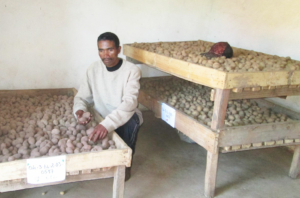Created in 2012, officially recognized in Madagascar since 2016, the young agricultural consulting association Cap Malagasy elected its first board of directors in March 2016. More than a year after taking office, President Georges Randriamarolahizafimandimimby answered our questions.
Can you introduce yourself in a few words?
Married since 1998 and father of 5 children – four boys and one girl – I live in the rural commune of Ambatofitorahana, Ambositra district, in the Amoron’ i Mania region. After graduating from high school, I settled as a farmer in 1996; I produce potato seeds on 40 acres and ware potatoes on 3.5 hectares. It must be said that our commune has long been famous for potato production; but in 2006, we had an episode of diseases (especially mildew) that put the sector at risk.
As far as breeding is concerned, I am also a producer of gasy chickens (local chicken) and pigs. Finally, I grow rice (25 ares), maize and beans (0.5 ha).
Since setting up, I have been doing my farming activities in a traditional way. In my municipality, we decided to create an association. To this end, we were able to collaborate with various technical partners (rural development support programme, UNDP, etc.) who offered activities and support for the creation of associations. At that time, there was a lack of in-depth knowledge about community life and management. There were also no technicians to accompany us in close proximity on the technical and organizational aspects.
In 2010, Fert intervened by setting up a communal animator called “Anico“, who really settled within the commune. He accompanied us on various aspects (production techniques, management techniques, organisation and associative life). Because of this close proximity, we could call on Anico at any time and the relationship of trust between us meant that we could share a lot with him, down to the last detail of our family budget. This was much appreciated by producers
.
You were elected President of the association Cap Malagasy on March 22nd, 2016: what was your journey as a peasant leader so far?
Since my installation in 2006, for the farmer’s course has been marked by several events:
- In 2010, I was first in an agricultural competition organised by Fert and the Regional Directorate for Rural Development, which was a real recognition of my work. In 2014, with the training offered by Fert – Peasant leaders training course – on local leaders, I was elected president of the “potato” union in my commune;
- In 2015, I was also elected a member of the municipal councilor, but also President of the Parents’ Association and the Ambatofitarahana public primary school. Responsibilities I’m trying to fulfill at best;
- In 2016, I was elected President of Cap Malagasy, as a representative of Fifata’s college of producer members, and this year I was elected President of the association of farmer tutors with the state project “Formaprod”.
What motivated you to commit?
Since the collaboration with Fert in 2012, and then with Cap Malagasy, I have been able to really improve my skills in the management of my farm. I have several examples to give you that have made a big difference in my family’s daily life: I was able to buy 25 ares of rice paddies and 2 ha of tanety, I improved the comfort of my family’s home by replacing the thatched roof with sheet metal, and I was able to buy equipment like a DVD player; but above all my children are now studying in private schools.
With the support of Cap Malagasy, I also trained to become a “relay farmer” for the potato industry. My responsibility as a relay farmer is to help and train producers on practical points such as phytosanitary treatments.
As President of Cap Malagasy, I am committed to ensuring that my peers can move forward and benefit from the advice provided by this local agricultural advisory association to become professional farmers.
What do you think are the key points to help growers move forward in their business?
Producers always need economical and technical advice on the management of their farms (production technology, management, organisation). In order to expand their operations, however, they also need access to credit from specialized financial institutions.
As the first President of this young association, what are the main lines of the project you wish to defend?
My first objective is first of all to have Cape Malagasy recognised at Fifata group level and more generally at national level in order to guarantee access to advice for a majority of farmers and thus improve the producers’ standard of living. I share the vision of the Fifata Group: for a “family, professional, competitive and flourishing agriculture”.





